Videos of the Martin Yale 1812 Paper Folder
Description of the Martin Yale 1812 Paper Folder
The Martin Yale 1812 automatic, friction-fed paper folder is a smooth, efficient machine with such a simple design that anyone, from church volunteers to business professionals, can use it. To operate the 1812, all the user has to do is adjust the folding plates according to the convenient measurement chart located on the front of the machine, and then insert the paper. It accepts a large range of paper weight without requiring an adjustment to the feed system, which saves time between folding jobs. Up to 90 lb paper can be handled. Like most friction-fed machines, the 1812 is not compatible with coated or glossy types of paper.
The feed table is able to hold a maximum of 500 sheets of paper weighing in at 20 lb letter size bond at once, and fold between 5,000 to 12,000 sheets per hour. The 1812 can handle paper measuring from 2.5" x 5.2" to 12" x 18".
The Martin Yale 12x18 Variable Speed AutoFolder has fold tables that are completely enclosed, for quieter production and better safety. The seven standard folds created include letter, z-fold, double parallel, half, gate, church cut and engineering/short z-fold, and custom folds are just one adjustment away. With such a variety of fold options available on this machine, the possibilities of types of material such as bulletins, flyers, invoices, etc. that you can create are endless. There is also a convenient detection signal should a jam occur.
If you're looking to boost your office productivity and cut the amount of time being wasted on simple and mindless tasks like paper folding, the Martin Yale 1812 automatic paper folder is what you have been searching for. Its multitude of features, all being backed by a 1 year limited warranty by Martin Yale, the 1812 automatic paper folder is an extremely viable paper folding machine option to anyone who is looking for ways to fold large volumes of paper on a regular basis.
Standout Features of the Martin Yale 1812 Paper Folder
11x17 Capability:
The main reason for moving up to an 1812 from the one of the smaller models (like the 1611) besides beefier build quality is going to be the paper size. The need to do 11x17 paper is fairly common, and with bigger paper comes bigger folders. Traditionally the 11x17 requirement would start to push you into pretty expensive models that are more designed for full time print shops. The 1812 does have great quality, but without all the fiddly adjustments some larger models have (like the Mark VII). If you want to do 11x17 paper, but still want the ease of use of a modern designed folder, the 1812 is your best bet.
Super Easy fold Plate Adjustments:
Many customers can be intimidated by all the numbers and charts associated with manual adjusting paper folders. This can cause them to look at more expensive, auto adjusting models, such as the 2051 (essentially an 1812 with automated fold plates). While there is definitely a good place in the market for the automation, we recommend fully exploring the manual option first. After a few folds, most will pick up on how easy it is. The 1812 is marked extremely well. All you have to do is move the knob on each fold plate to the corresponding letter on the chart. For example, if you have standard 11" long paper, a "C" or "letter" fold simply requires you to move the top plate to the letter "M" and the bottom fold plate to the letter "E." We found the markings on the fold plates to be very accurate and clearly marked.

Huge Capacity Paper Tray:
The most common question we get on folders is "how many sheets can it hold?" The entire point of a folding machine is efficiency. At 500 sheets, an entire ream of paper can fit in feeder, beating out almost all of the competition. This is about as large as it gets for feed tray capacity, and we like that they didn't come up short here.
Easy Fold Plate Install:
This seems like a small thing, but we get a ton of service calls from customers with problems relating to fold plate alignment. Fold plates need to be inserted securely into the body of the folding machine. If not done correctly, jams will occur. A lot of folders that we've tested, even folders we love, tend to have strangely difficult fold plate installs. With the 1812 autofolder, you won't have to weave the plates between metal knobs or slap the plates until they click. These fold plates slide securely into the machine like butter without doubt or question if it was properly positioned. Little details like this provide good clues as to the level of precision and care during the manufacturing process. One other interesting fact is that the top and bottom fold plates are identical. One of the most common problems with folding machines is mistaking the top fold plat from the bottom or vise versa, which can completely through off the fold. With this model, you don't have to worry about making fold plate mistakes, which is just one more feature that helps to streamline the experience, especially for newer folding machine users.
Jam Clearing:
Every folder jams at some point. What counts is how the folder handles the jam. The Martin Yale 1812 comes with a rather thick jam clearing wrench. Simply pull out of it's dedicated slot, place it over the main axle and turn until the paper comes out naturally. With most folders, jams turn into an inevitable tug of war between the frustrated end user and that jammed paper. This can cause small pieces to tear and fall into the machine. These pieces can cause even more problems and are harder to diagnose down the road. Jam clearing features like this seem small now, but can mean big time savings in the future.
Fold Consistency:
With paper folding machines, consistency is king. This is especially true with personalized documents such as notices, bills, or even checks. We've put the 1812 through some pretty serious stress tests, including a 5 ream run, without any incidents. That being said, the true stress test comes after years of use. This folder is no longer the new kid on the block, and after a few years out in the field, we are still seeing great results. The larger in the Martin Yale line you get, the more consistent the results, and the 1812 is at the top of their lineup, so we've come to expect very high consistency. Another aspect of consistency is maintenance, so be sure keep the rollers and feed tire clean after heavy use to prevent roller decay. We recommend purchasing our 1812 Folder Preventative Maintenance Kit to keep your 1812 running smoothly.
Variable Speed:
The variable speed option is almost unheard of in most folding machines now. You usually only run into a feature like this when working with large industrial paper folders. We love how you can adjust the speed on the fly, while the folder is running. Decreasing the speed can help avoid jams and other paper issues. The main reason we love the variable speed option on folders, though, is sound reduction. By reducing the speed, you can cut the noise level by a ton. This is especially helpful if this folder is going to be in the middle of an office, or even in a copy room that is close to employee work spaces. Because of the nature of paper slamming against fold plates, folders are very loud machines. If this is a problem, I'd definitely narrow your search to a folder that has variable speed an option.
Made in the USA:
It's actually very rare to see office equipment that's built in the U.S. anymore, and this is just as true for folding machines. While your shopping for your next folding machine, consider where it's made... then consider the fine machine craftsman in Wabash, Indiana. Not only will we be supporting you, but so will the folks at Martin Yale. As a supporting service company, Whitaker Brothers' relationship to the engineers and factory is an essential aspect of working through support issues after the sale. Martin Yale's factory has a strong history of providing folding machines, and it's great to see that spirit continue as their products evolve as they have in the 1812 model.




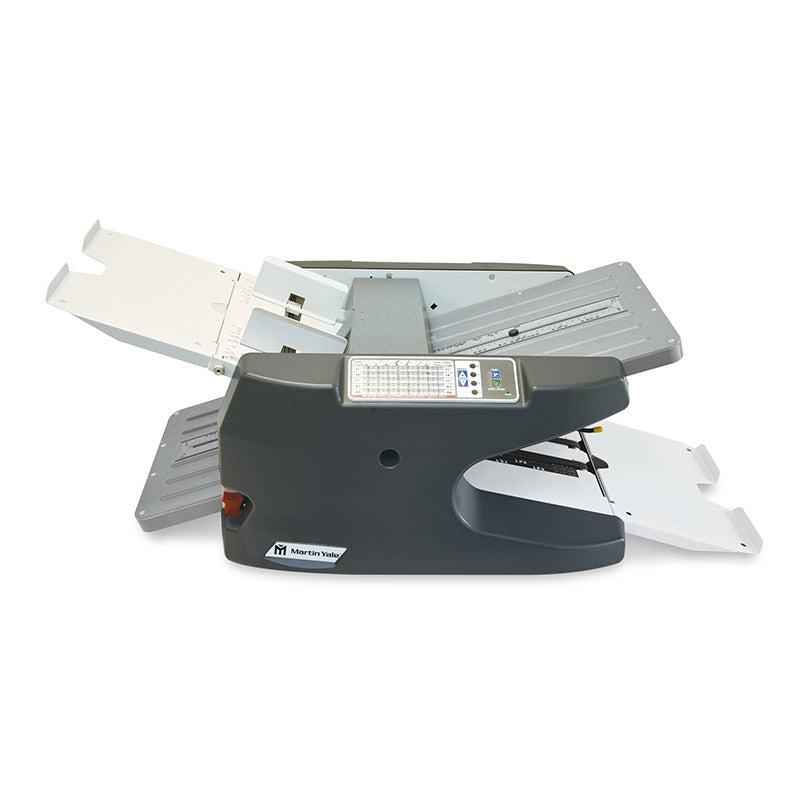
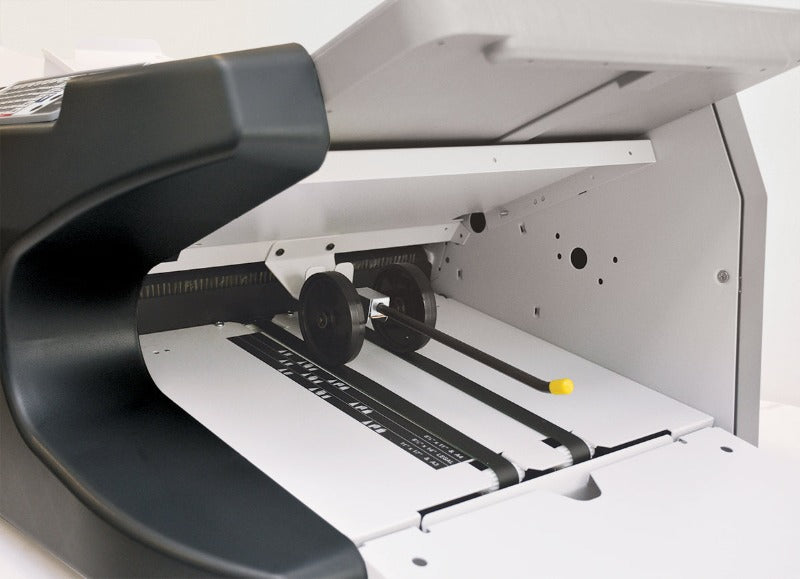
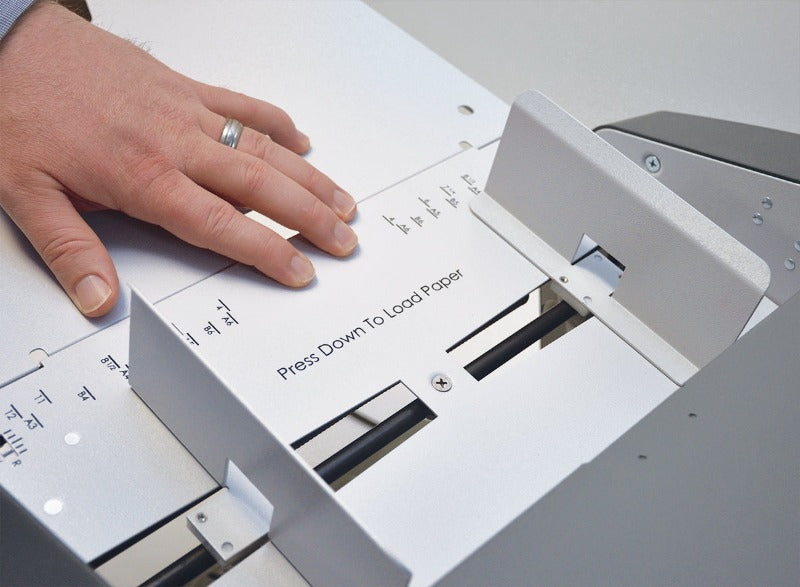
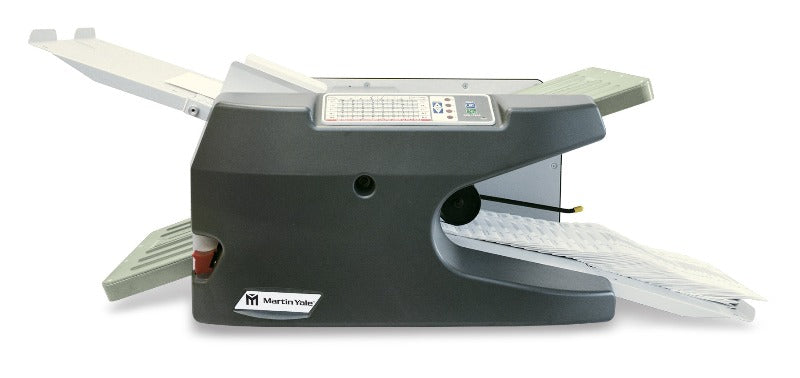
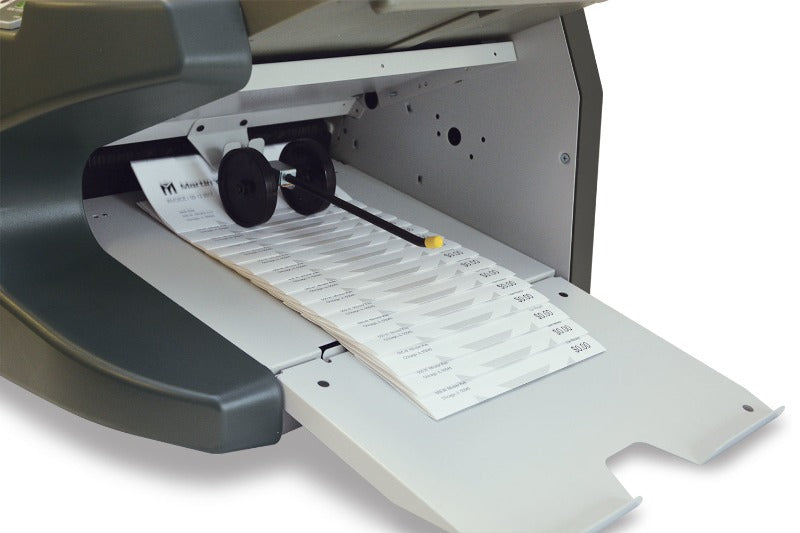
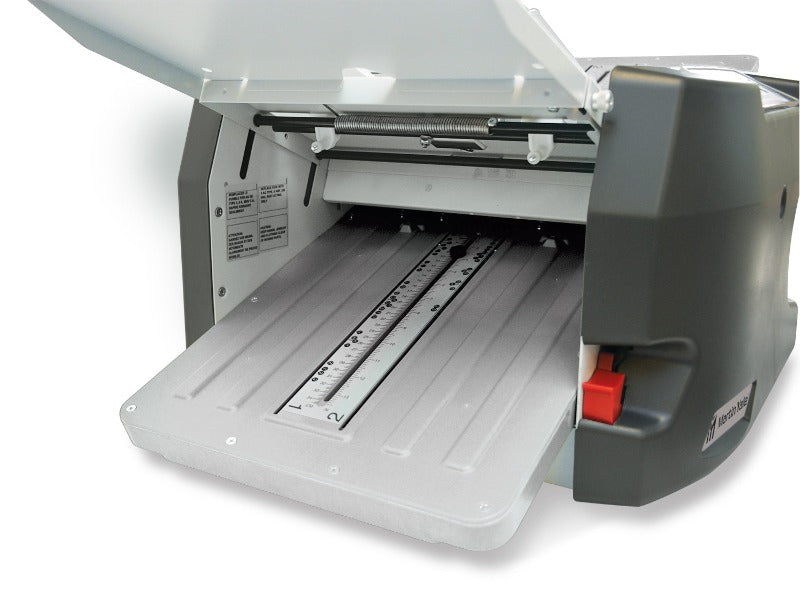
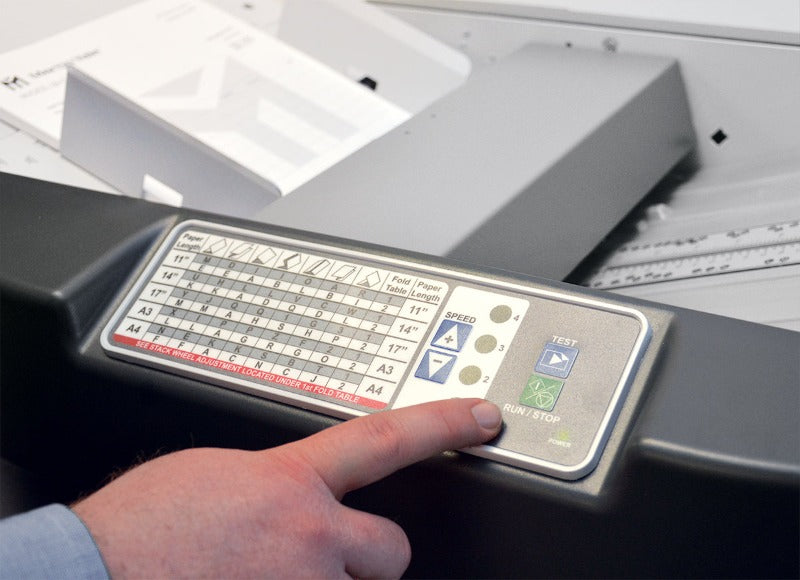
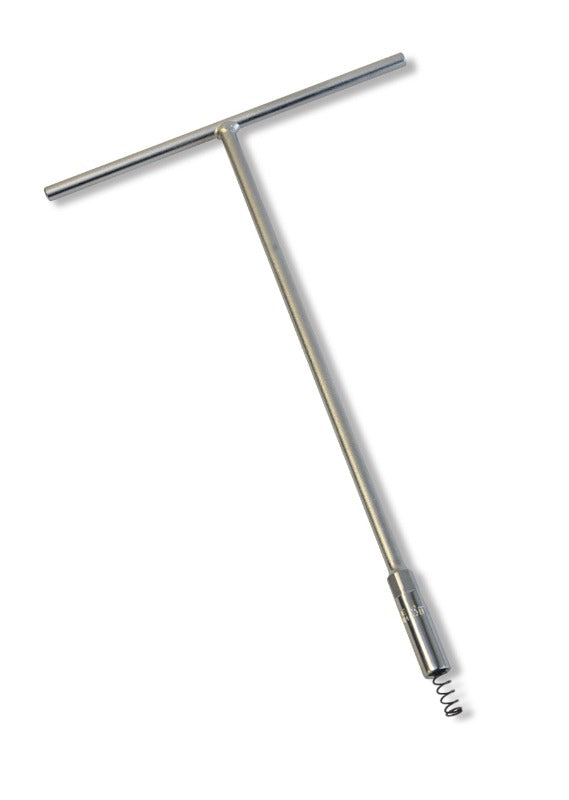
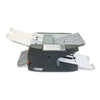







 (2)
(2) (3)
(3) (4)
(4) (5)
(5) (6)
(6) (7)
(7)
